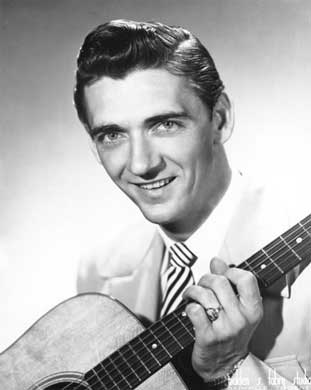The Country Gentleman
Carl Smith
March 15, 1927-January 16, 2010Carl Smith, one of country music’s premier honky tonk-influenced singers of the 1950s and 1960s, once wed to June Carter, with whom he had a daughter, Carlene Carter, and a member of the Country Music Hall of Fame, died of natural causes on January 16. He was 82.
Born in Roy Acuff’s home town of Maynardsville, TN, Smith set his goal of appearing on the Grand Ole Opry even before he had learned to play an instrument. As a 15-year-old he began performing in country bands and by 17 was appearing on Knoxville’s WROL-AM. After graduating from high school and serving a stint in the Navy, he returned to WROL and also began playing string bass for other country singers, including Molly O’Day. WSM—AM, home of the Grand Ole Opry, signed Smith after hearing him on an acetate recording, and in 1950 producer Don Law signed him to Columbia Records. After his 1951 single “Let’s Live a Little” peaked at #2 on the country chart, he broke out in ’52 with three consecutive #1 singles—“Let Old Mother Nature Have Her Way,” “(When You Feel Lie You’re In Love) Don’t Just Stand There” and “Are You Teasing Me”—and followed those in ’52 with another chart topper, “Hey Joe.” Throughout the remainder of the decade he was a regular in the Top 10 and in the latter ‘50s became a substitute host for Red Foley on the popular country music TV show, Ozark Jubilee; he was also a beloved and influential artist in Canada during this time. Dressed impeccably in the rhinestone-studded western outfits popular among male mainstream country artists of the day, singing in a beefy baritone voice and projecting a warm, genial personality that earned him the nickname “The Country Gentleman,” Smith appealed to both traditionalists and to those who preferred the harder rhythmic edge of the ascendant honky-tonk, and he boasted a band, the Tunesmiths, that could take him wherever he wanted to go stylistically. Among its exemplary musicians was an outstanding lead guitarist, Sammy Pruett, and the inventive steel guitarist Johnny Silbert, a now-legendary stylist who stood out on all of Smith’s records, executing some solos that remain among the most challenging ever fashioned on the instrument; he also recorded with Lefty Frizzell, the Everly Brothers and a host of other top names of the day, and was inducted into the Steel Guitar Hall of Fame in 1998. Smith made his debut album in 1955 with Carl, Marty and Lefty, a teaming with labelmates Marty Robbins and Lefty Frizzell, and, later in the year, a self-titled LP release. Though several of these are interesting collections of gospel songs (Softly and Tenderly, from 1956) and love songs (Kisses Don’t Lie, 1965), only 1964’s There Stands The Glass made any substantial chart showing, peaking at #9.
Carl Smith, ‘You Are the One,’ a #3 country single in 1957, featuring a pedal steel solo by Johnny SilbertIn 1952 Smith married June Carter, and three years later the couple had a daughter, Rebecca Smith, who changed her name to Carlene Carter when she began her own career in contemporary country and rock. Following his divorce from Carter in 1957, Smith married Goldie Hill, a pioneer among female country singers who had topped the singles charts in 1953 with “I Let the Stars Get In My Eyes.” Hill then retired from the business, and she and Smith remained married until her death in 2005.
Although Smith had one moderate pop hit, 1959’s #43 “Ten Thousand Drums,” he was never able to achieve other crossover success, and with the arrival of the 1960s his commercial appeal began to wane. Between 1962 and his retirement year of 1978 he had only one Top 10 hit, 1967’s “Deep Water,” although he did have nine others that rose into the Top 20. In 1980 he attempted a short-lived comeback with Gusto Records, re-recording some of his previous hits and releasing two albums, Greatest Hits (1980) and The Legendary Carl Smith (1982).
In his essential Country Music USA, historian Bill C. Malone, noting Smith’s great popularity in the ‘50s, lamented: “It is regrettable that Smith is so seldom remembered today, because few singers enjoyed the commercial prominence that he had, in this country and in Canada, during the first half of the fifties.”
The Essential Carl Smith (1950-1956) is available at www.amazon.com
Founder/Publisher/Editor: David McGee
Contributing Editors: Billy Altman, Laura Fissinger, Christopher Hill, Derk Richardson
Logo Design: John Mendelsohn (www.johnmendelsohn.com)
Website Design: Kieran McGee (www.kieranmcgee.com)
Staff Photographers: Audrey Harrod (Louisville, KY; www.flickr.com/audreyharrod), Alicia Zappier (New York)
E-mail: thebluegrassspecial@gmail.com
Mailing Address: David McGee, 201 W. 85 St.—5B, New York, NY 10024


